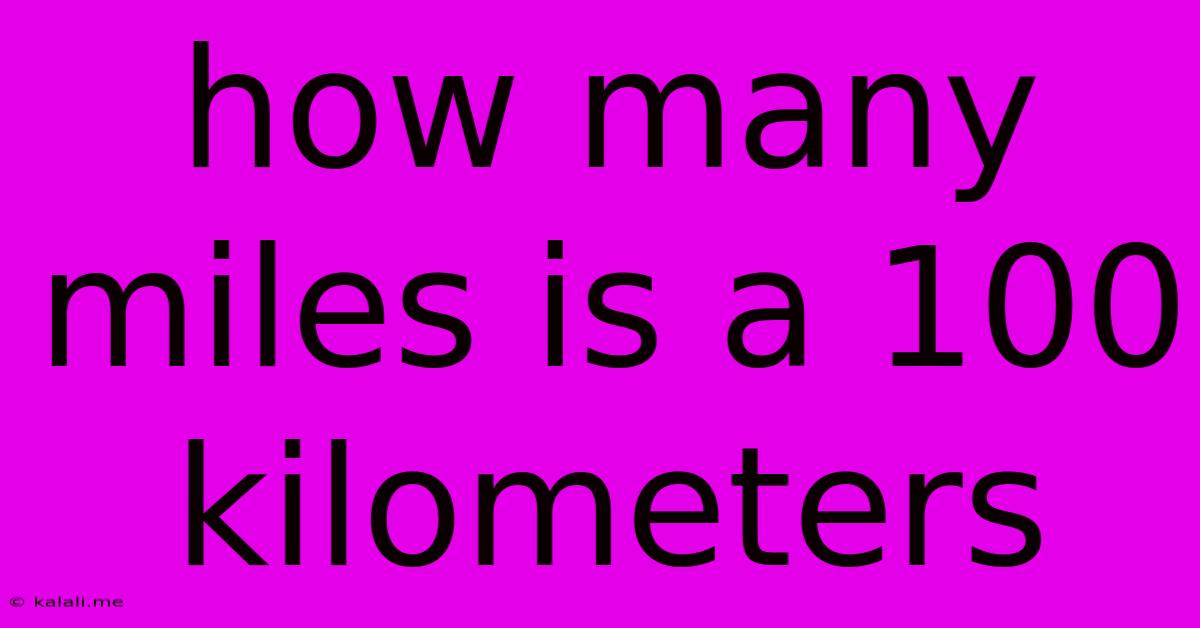How Many Miles Is A 100 Kilometers
Kalali
May 09, 2025 · 2 min read

Table of Contents
How Many Miles is 100 Kilometers? A Comprehensive Guide to Metric-Imperial Conversion
Knowing how to convert between kilometers and miles is crucial in today's interconnected world. Whether you're planning a road trip, interpreting a fitness tracker, or simply understanding global distances, this conversion is a valuable skill. This article will clearly explain how many miles are in 100 kilometers and provide you with the tools to perform these conversions yourself. We'll also explore some common scenarios where this conversion is particularly helpful.
100 kilometers is equal to approximately 62.14 miles. This is a key figure to remember, particularly for those frequently traveling or working with distances spanning both metric and imperial systems.
Understanding the Conversion Factor
The core of converting kilometers to miles lies in understanding the conversion factor. One kilometer is equal to approximately 0.621371 miles. This seemingly small difference in numbers adds up significantly over longer distances.
To convert kilometers to miles, you simply multiply the number of kilometers by the conversion factor:
- Miles = Kilometers x 0.621371
Therefore, for 100 kilometers:
- Miles = 100 km x 0.621371 miles/km = 62.1371 miles
We typically round this to 62.14 miles for practical purposes.
Real-World Applications of Kilometer to Mile Conversion
This seemingly simple conversion has broad applications in various aspects of life:
-
Travel Planning: Whether you're planning a road trip across the country or an international journey, understanding the distance in both kilometers and miles ensures you can accurately assess travel time and fuel consumption using different maps and navigation tools. Converting kilometers displayed on a foreign map to the more familiar miles can significantly aid your planning.
-
Fitness Tracking: Many fitness trackers and apps default to either kilometers or miles. Understanding the conversion allows you to seamlessly compare your progress and distances regardless of the unit used. This is particularly helpful if you're using multiple fitness apps or devices.
-
International Shipping and Logistics: Global trade heavily relies on accurate distance calculations. Converting between kilometers and miles ensures consistency and accuracy in shipping estimates and logistical planning.
-
Real Estate: Property descriptions often list distances to amenities in either kilometers or miles. Understanding the conversion prevents misinterpretations and assists in making informed decisions.
Beyond 100 Kilometers: Performing Your Own Conversions
You don't need a calculator specifically designed for unit conversions! Armed with the conversion factor (0.621371), you can easily convert any distance expressed in kilometers to miles. Simply multiply the number of kilometers by this factor. Similarly, to convert miles to kilometers, you would divide the number of miles by this factor, or multiply by the reciprocal (approximately 1.609).
Conclusion: Mastering the Conversion
Mastering the conversion between kilometers and miles is a valuable skill with extensive real-world applications. Understanding the simple formula and the conversion factor empowers you to seamlessly navigate distances expressed in both systems. Remember, 100 kilometers is roughly 62.14 miles – a figure that will prove handy in your daily life.
Latest Posts
Latest Posts
-
Color And Temperature Of Stars Chart
May 09, 2025
-
How Cold Is 40 Degrees Fahrenheit
May 09, 2025
-
How Many Ounces Is 18 Ml
May 09, 2025
-
4 Out Of 17 As A Percentage
May 09, 2025
-
What Is The Probability Of Getting A Homozygous Recessive
May 09, 2025
Related Post
Thank you for visiting our website which covers about How Many Miles Is A 100 Kilometers . We hope the information provided has been useful to you. Feel free to contact us if you have any questions or need further assistance. See you next time and don't miss to bookmark.